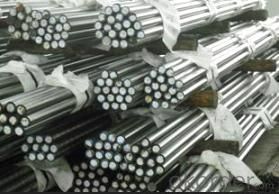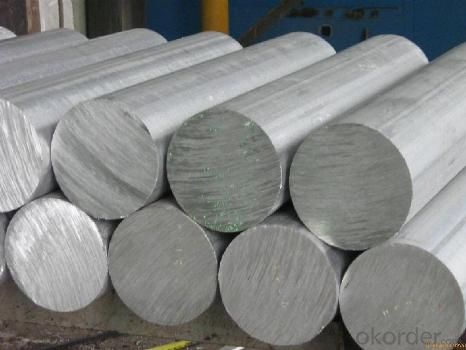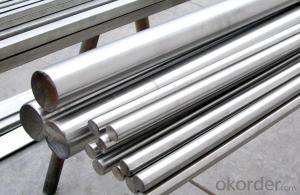Forged Spring Steel Round Bar with the Size 20mm
- Loading Port:
- Shanghai
- Payment Terms:
- TT or LC
- Min Order Qty:
- 20 m.t.
- Supply Capability:
- 500 m.t./month
OKorder Service Pledge
OKorder Financial Service
You Might Also Like
Product Description:
OKorder is offering Forged Spring Steel Round Bar with the Size 20mm at great prices with worldwide shipping. Our supplier is a world-class manufacturer of steel, with our products utilized the world over. OKorder annually supplies products to European, North American and Asian markets. We provide quotations within 24 hours of receiving an inquiry and guarantee competitive prices.
Product Applications:
Forged Spring Steel Round Bar with the Size 20mm is widely used to make the bearing used in automobile, tractor engine, transmission and the wheel. And it also used to make the main bearing for the machine tools, electrical machinery, mining machinery, electric locomotives,mechanical ventilation and high speed of grinding wheel spindle etc
Product Advantages:
OKorder's Forged Spring Steel Round Bar with the Size 20mm with High Quality are durable, diversified and qualified.
Main Product Features:
· Premium quality
· Prompt delivery & seaworthy packing (30 days after receiving deposit)
· Can be recycled and reused
· Mill test certification
· Professional Service
· Competitive pricing
Product Specifications:
Manufacture: Hot rolled
Grade: 20CrNiMoA 20CrNi2MoA 16Cr2Ni4MoA 12Cr2Ni3Mo5A 20Cr2Ni4A 20Cr2Ni2MoA
Cr4Mo4V Cr15Mo4 W9Cr4V2Mo W18Cr4V W6Mo5Cr4V2 5CrMnMo 60CrMnMoNi 37CrA 55SiMoVA etc
Certificates: ISO, SGS, BV, CIQ
Length:6m 8m 9m 12m
Packaging: Packed in bundles with standard export sea-worthy package or as customer require
FAQ:
Q1: Why buy Materials & Equipment from OKorder.com?
A1: All products offered byOKorder.com are carefully selected from China's most reliable manufacturing enterprises. Through its ISO certifications, OKorder.com adheres to the highest standards and a commitment to supply chain safety and customer satisfaction.
Q2: How do we guarantee the quality of our products?
A2: We have established an advanced quality management system which conducts strict quality tests at every step, from raw materials to the final product. At the same time, we provide extensive follow-up service assurances as required.
Q3: How soon can we receive the product after purchase?
A3: Within three days of placing an order, we will begin production. The specific shipping date is dependent upon international and government factors, but is typically 7 to 10 workdays.
Q4: How many types of bearing steel that OKorder.com can supply?
A4: Two types, carbon spring steel and alloy spring steel
Images:


- Q:Can special steel be used in the sporting goods manufacturing industry?
- Yes, special steel can be used in the sporting goods manufacturing industry. Special steel, with its unique properties such as high strength, durability, and corrosion resistance, can be utilized in the production of various sporting goods such as golf clubs, baseball bats, tennis rackets, and bicycle frames. The use of special steel in these products enhances their performance, increases their lifespan, and provides better overall quality to athletes and sports enthusiasts.
- Q:What are the key differences between special steel and tool steel?
- Special steel and tool steel are both types of steel that have specific characteristics and applications. The key difference between special steel and tool steel lies in their intended use and properties. Special steel is a broad category that includes various types of steel with specialized properties for specific applications. It is often used in industries such as aerospace, automotive, and construction. Special steel may have enhanced strength, corrosion resistance, heat resistance, or other specific properties, depending on its intended application. On the other hand, tool steel is a specific type of special steel that is specifically designed for making tools. It has exceptional hardness, wear resistance, and toughness, which makes it suitable for applications where cutting, shaping, or forming materials is required. Tool steel is commonly used in the manufacturing of tools such as drills, hammers, dies, and molds. In summary, while special steel is a broader category that encompasses various types of steel with specialized properties, tool steel is a specific type of special steel that is specifically formulated for making tools, offering exceptional hardness, wear resistance, and toughness.
- Q:What are the different methods of improving the creep resistance of special steel?
- To enhance the creep resistance of special steel, various methods can be employed. These methods aim to improve its ability to withstand high temperatures and constant stress over a long period of time. Commonly used techniques include: 1. Alloying: By adding specific elements like chromium, molybdenum, tungsten, and vanadium, the creep resistance of special steel can be significantly enhanced. These alloying elements form strong carbides or intermetallic compounds that impede dislocation movement, thereby increasing the material's strength and resistance to creep. 2. Heat treatment: Precise heat treatment techniques, such as quenching and tempering, annealing, and normalizing, can be employed to improve the creep resistance of special steel. These processes alter the microstructure of the steel, resulting in the formation of fine-grained and homogeneous structures that offer better creep resistance. Heat treatment also helps in relieving residual stresses and enhancing the overall strength of the material. 3. Grain refinement: Special steel can undergo processes that refine its grain structure, thereby improving its creep resistance. Techniques like controlled rolling, recrystallization, and severe plastic deformation can reduce the grain size and make it more uniform. This refined microstructure hinders dislocation movement and enhances the material's resistance to creep deformation. 4. Precipitation hardening: Special steel can be subjected to precipitation hardening methods, where it is heated and then rapidly cooled to induce the formation of fine precipitates. These precipitates act as barriers to dislocation movement, thereby improving the material's strength and creep resistance. 5. Surface modification: Surface modification techniques, such as shot peening, laser surface melting, and surface coatings, can be applied to increase the creep resistance of special steel. These methods improve the surface integrity, reduce roughness, and introduce compressive residual stresses, all of which contribute to enhanced creep resistance. It is important to consider the specific requirements of the application and the type of special steel being used when selecting and combining these methods. The goal is to optimize the material's microstructure, chemical composition, and surface characteristics in order to achieve the desired creep resistance and ensure long-term performance at elevated temperatures.
- Q:What are the different corrosion-resistant coatings for special steel?
- There are several different corrosion-resistant coatings available for special steel, each with their own unique properties and advantages. Some of the most common ones include: 1. Zinc Coating: Zinc coatings, such as galvanizing, are widely used to protect special steel from corrosion. The zinc layer acts as a sacrificial barrier, preventing the steel from coming into contact with corrosive elements. 2. Epoxy Coating: Epoxy coatings are a popular choice for corrosion protection due to their excellent adhesion, chemical resistance, and durability. They form a strong barrier that shields the special steel from moisture, chemicals, and other corrosive agents. 3. Polyurethane Coating: Polyurethane coatings provide exceptional resistance to abrasion, chemicals, and weathering. They are often used in harsh environments where the special steel is exposed to extreme conditions, such as offshore or marine applications. 4. Ceramic Coating: Ceramic coatings offer high-temperature resistance and excellent corrosion protection. They are commonly used in industries like aerospace and automotive, where the special steel needs to withstand extreme temperatures and corrosive environments. 5. Metal Coating: Metal coatings, such as nickel or chromium, are often applied to special steel to enhance its corrosion resistance. These coatings create a protective layer that prevents the steel from corroding by acting as a physical barrier. 6. Powder Coating: Powder coatings are applied electrostatically and then cured under heat, forming a hard and durable protective layer. They offer excellent corrosion resistance and can be customized in terms of color and texture. It is important to select the appropriate corrosion-resistant coating based on the specific requirements of the special steel and the environment in which it will be used. Factors such as temperature, exposure to chemicals or moisture, and the desired lifespan of the coating should all be considered when choosing the right coating.
- Q:How does special steel perform in surface hardening applications?
- Special steel is renowned for its exceptional performance in surface hardening applications, as it possesses certain desirable properties such as high strength, toughness, and resistance to corrosion and heat. Unlike regular steel, special steel exhibits superior characteristics when it comes to surface hardening. This is due to the presence of alloying elements like chromium, molybdenum, and vanadium, which enhance its hardenability and allow for effective heat treatment processes such as carburizing, nitriding, or induction hardening. These processes alter the microstructure of the steel surface, resulting in increased hardness and wear resistance. What sets special steel apart is its ability to be hardened to a greater depth compared to regular steel. This quality makes it an ideal choice for surface hardening applications, as the hardened layer provides protection against abrasion, erosion, and fatigue, significantly prolonging the lifespan of the component. Moreover, the improved wear resistance and hardness of special steel make it suitable for industries such as automotive, aerospace, and manufacturing, where components are subjected to extreme conditions and high levels of stress. Furthermore, even after surface hardening, special steel retains its exceptional mechanical properties, ensuring durability and the ability to withstand heavy loads and impacts without failure. This combination of hardness and toughness is crucial for applications where both wear resistance and structural integrity are vital. In conclusion, special steel is highly effective in surface hardening applications due to its superior hardenability, wear resistance, and mechanical properties. Its ability to endure extreme conditions while maintaining durability makes it the preferred choice for industries that require components with enhanced surface hardness and longevity.
- Q:What are the main characteristics of high-speed steel?
- High-speed steel (HSS) is a type of tool steel that is widely used in machining applications due to its exceptional properties. The main characteristics of high-speed steel include: 1. Superior Hardness: HSS is known for its remarkable hardness, which allows it to withstand high temperatures and resist wear. This hardness is achieved through the addition of various alloying elements like tungsten, molybdenum, cobalt, vanadium, and chromium. 2. Excellent Heat Resistance: High-speed steel has exceptional heat resistance, enabling it to maintain its hardness and strength even at elevated temperatures. This property is crucial in applications where the tool needs to withstand high cutting speeds and generate significant amounts of heat. 3. Good Toughness: HSS possesses good toughness, which means it can resist cracking and chipping under heavy loads or impact. This characteristic ensures that the tool can endure demanding cutting conditions without premature failure. 4. High Wear Resistance: HSS exhibits high wear resistance, making it suitable for cutting, drilling, and milling operations. It can withstand prolonged usage without losing its sharpness or performance, resulting in extended tool life. 5. Versatility: High-speed steel is highly versatile and can be used for a wide range of applications, including cutting, shaping, and forming various materials such as metals, plastics, and wood. Its versatility makes it a popular choice in industries like manufacturing, automotive, aerospace, and construction. 6. Ease of Machining: HSS can be easily machined and shaped into different tool designs, which allows for customization and optimization based on specific applications. This characteristic makes it a preferred material for manufacturing cutting tools like drills, end mills, taps, and saw blades. 7. Cost-Effective: Compared to other high-performance tool materials like carbide, high-speed steel is relatively more cost-effective. It provides a balance between performance and affordability, making it a cost-efficient choice for many machining applications. In conclusion, high-speed steel is valued for its exceptional hardness, heat resistance, toughness, wear resistance, versatility, ease of machining, and cost-effectiveness. These characteristics make it a preferred material for a wide range of cutting tools, ensuring efficient and reliable machining operations.
- Q:How does the corrosion resistance of special steel compare to regular steel?
- Generally, special steel outperforms regular steel in terms of corrosion resistance. Special steel is specifically engineered to possess enhanced resistance against corrosion, thanks to its unique composition and manufacturing process. It often contains higher levels of alloying elements like chromium, nickel, and molybdenum. These elements create a protective layer on the steel's surface, preventing it from reacting with corrosive substances. In contrast, regular steel tends to have lower corrosion resistance due to its composition and lack of alloying elements. It is more susceptible to rusting and other forms of corrosion when exposed to moisture, atmospheric gases, or chemicals. Additionally, special steels can undergo additional treatments such as heat treatment, passivation, or coating. These treatments further elevate their corrosion resistance by forming a barrier against corrosive agents. As a result, the lifespan and durability of the steel are extended in corrosive environments. To summarize, special steel surpasses regular steel in terms of corrosion resistance due to its composition, alloying elements, and additional treatments. This quality makes it the preferred choice in applications where corrosion resistance is crucial, such as marine environments, chemical processing plants, or infrastructure exposed to harsh weather conditions.
- Q:What are the factors that affect the weldability of special steel?
- The factors that affect the weldability of special steel include the chemical composition of the steel, the presence of impurities or alloying elements, the heat treatment history, the thickness of the steel, the welding process and technique used, and the pre-weld and post-weld treatments.
- Q:How does special steel contribute to the electrical conductivity of products?
- Special steel contributes to the electrical conductivity of products by offering high levels of purity and low levels of impurities. Its composition and manufacturing process ensure that it has excellent conductivity and minimal resistance, allowing for efficient flow of electric current.
- Q:How does special steel contribute to the renewable energy conversion efficiency?
- Special steel plays a crucial role in enhancing the renewable energy conversion efficiency by providing durability, strength, and resistance to extreme conditions. It is used in the construction of wind turbines, solar panels, and hydropower systems, ensuring their reliability and longevity. Moreover, special steel alloys facilitate the development of more efficient and lightweight components, reducing energy losses and optimizing the overall performance of renewable energy systems.
1. Manufacturer Overview |
|
|---|---|
| Location | |
| Year Established | |
| Annual Output Value | |
| Main Markets | |
| Company Certifications | |
2. Manufacturer Certificates |
|
|---|---|
| a) Certification Name | |
| Range | |
| Reference | |
| Validity Period | |
3. Manufacturer Capability |
|
|---|---|
| a)Trade Capacity | |
| Nearest Port | |
| Export Percentage | |
| No.of Employees in Trade Department | |
| Language Spoken: | |
| b)Factory Information | |
| Factory Size: | |
| No. of Production Lines | |
| Contract Manufacturing | |
| Product Price Range | |
Send your message to us
Forged Spring Steel Round Bar with the Size 20mm
- Loading Port:
- Shanghai
- Payment Terms:
- TT or LC
- Min Order Qty:
- 20 m.t.
- Supply Capability:
- 500 m.t./month
OKorder Service Pledge
OKorder Financial Service
Similar products
New products
Hot products
Related keywords






























